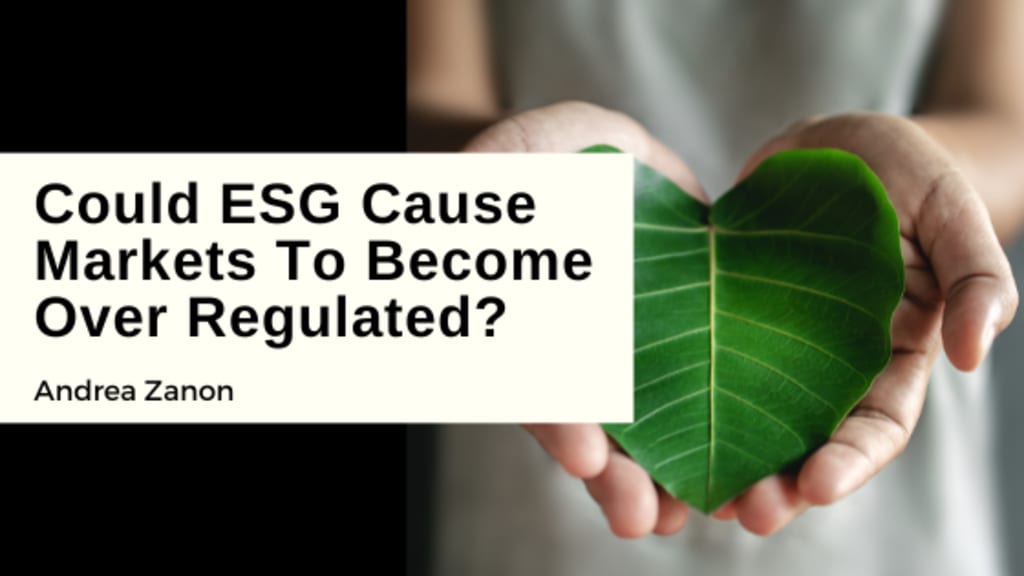Could ESG Cause Markets To Become Over Regulated?
While the ESG agenda aims to bring a more balanced approach to the way we deal with the environment, society and corporate boards, the regulators may be interfering with market forces and creating negative externalities.

The environmental, social, and governing attributes of the ESG model show themselves as more than relevant to the current society and marketplace. The standards that capital markets are held accountable to dictate the future successes and failures of society. The reliability of the ESG model comes from its ability to measure the value, the risk and its mitigation measures of an organization. Global regulations are being spearheaded by the Security Exchange Commission and the European Union with the virtues of ESG in mind. Tomorrow is the day when agencies must achieve ESG standards and comply with stricter reporting and disclosure requirements. This will come in full force in 2022 when bot the United States (through the Security and Exchange Commission, and the European Union via Brussels) will make compulsory for business to report their ESG footprint and develop a public score.
Adopting a Global Standard
With world economies connected through technology, and daily trading our global-business market will take its structure from the talking points of ESG. Businesses will evaluate themselves based on their environmental impact, their social relationships, and the managing styles of their leaders. The global standard being adopted is one that sets the stage for new regulations. What those rules and laws will be is based on how many capital markets players hold to the ESG formula. The standardization process is complex and will unlikely create a metric that can fit all the global corporate needs. It is however a good start as we are late in addressing the ESG challenges.
Understanding Individual Contributions
Through the help of a global standard, capital markets, banks, and individual businesses get a better understanding of the contributions they need to make. The promises of ESG are those that enable sustainability and, therefore, business longevity and share prosperity creation. The regulatory standards emerging, however, can only be abided by when businesses become agents of the virtues that build society and improve its quality of life. Understanding such contributions is necessary for success. Ein general, ESG good reporting correlates with better corporate performance as well as with a healthier, safer, and more balanced corporate environment. Every corporation interested in long term growth should integrate ESG in their business model and start systematically thinking about ways to improve their ESG scoring as this will directly improve their bottom line.
Sustainability and Inclusion
The trends that ESG regulation will generate center around greater transparency and reporting of capital markets and long-term sustainability. Sustainability isn’t limited to how businesses interact with or use natural resources. In many ways, the needs of society call for corporation that respect the social economies they serve. How employees are treated can make or break the promises of sustainability. Inclusion, on the other hand, establishes a free market where innovation thrives.
Mandatory Reporting
Future regulation is possible through reporting that assesses the milestones of ESG and that fits the businesses without over-regulating them. How future businesses are evaluated calls for compliance, but how strict or lenient the compliance is—is subject to debate. What we can firmly say now is how revolutionary the ESG model became and we just need to make sure the private sector and the politicians strike a good balance.
Conclusion
There is increasing evidence that those corporations that measure their ESG impacts, are performing better than those that are not, both operationally as well as financially as witnessed by the higher performance of ESG stocks during the covid 19 crisis. Furthermore, once companies are aware of their ESG score, they typically are in a better position to act and improve their performance. This can then be used as a marketing and positioning strategy while avoiding any type of Greenwashing.
Whether you are an ESG fan or not, we believe that there is sustainability revolution in the making. The consumer is demanding greater transparency from businesses and capital markets, and governments are coordinating more proactively to ensure that resources are better managed and distributed. I think ESG will deliver both societal and corporate value in the medium term and it’s time for both the private and public sectors to embrace the challenge and find some common ground.
About the Creator
Andrea Zanon
Andrea Zanon is an international sustainable development and empowerment specialist who has dedicated his life to reducing poverty, promoting sustainability and empowering ambitious people






Comments
There are no comments for this story
Be the first to respond and start the conversation.